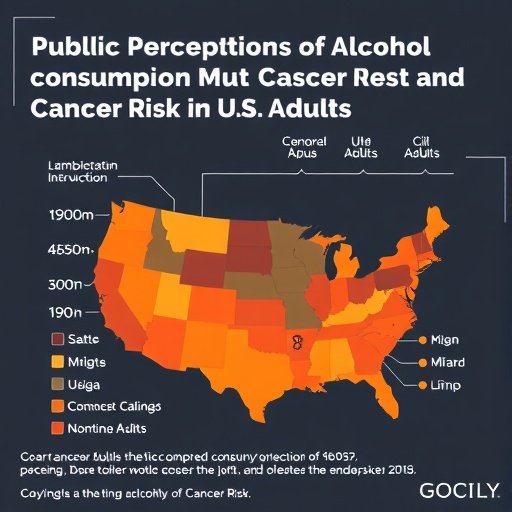New Study Exposes Alarming Misconceptions About Alcohol and Cancer Risk Among U.S. Adults
In a groundbreaking new study published in JAMA Oncology, researchers have uncovered a persistent and troubling gap in public understanding about the relationship between alcohol consumption and cancer risk in the United States. Despite growing scientific evidence linking alcohol to multiple cancer types, a significant portion of U.S. adults continue to underestimate or outright deny any cancer risk associated with drinking alcohol. This glaring disconnect raises urgent concerns about increased alcohol consumption and its implications for public health.
The research highlights a deeply ingrained misbelief cycle, where many individuals who consume alcohol tend to perceive it as harmless regarding cancer development. This cognitive dissonance is particularly disturbing given the well-documented carcinogenic effects of alcohol, which have been corroborated through molecular, epidemiological, and clinical studies over recent decades. As alcohol-related cancer incidence rises steadily in the U.S., understanding and addressing these misconceptions is crucial for effective prevention strategies.
At the molecular level, ethanol—the active ingredient in alcoholic beverages—is metabolized into acetaldehyde, a compound classified by the International Agency for Research on Cancer (IARC) as a Group 1 carcinogen. Acetaldehyde can cause DNA damage, promote mutations, and impair cellular repair mechanisms, thereby directly contributing to oncogenesis. Alcohol also enhances cancer risk through indirect mechanisms, including immunosuppression, modulation of hormone levels such as estrogen, and exacerbation of inflammatory pathways, which collectively potentiate malignant transformation.
Despite this biological plausibility and extensive epidemiological evidence linking alcohol drinking to cancers of the liver, breast, colorectal tract, esophagus, and mouth, misconceptions persist at the population level. The study’s survey data reveal that individuals who consume alcohol are disproportionately less likely to acknowledge this risk, reflecting a concerning trend of willful ignorance or cognitive bias. This suggests that risk communication campaigns on alcohol-related cancer hazards have been relatively ineffective or insufficiently targeted.
Furthermore, the continuous increase in alcohol consumption rates in the U.S. compounds the problem. Public health records indicate that per capita alcohol intake has escalated in the past decade, especially among younger adults and women, who may be especially vulnerable to alcohol-induced carcinogenesis. Since cancer development often occurs after prolonged exposure to carcinogens, the combination of rising alcohol consumption and persistent risk denial portends an escalated burden of preventable cancer morbidity and mortality.
Health communication experts emphasize that these findings underscore the necessity for recalibrated public education emphasis. Traditional messages focusing solely on the social or immediate health consequences of drinking may no longer suffice. Instead, campaigns must communicate the nuanced cancer risks using clear, evidence-based language while countering myths and misinformation. Leveraging behavioral science to address cognitive biases and enhance risk perception may be critical in reshaping drinking attitudes.
Beyond public awareness, healthcare practitioners play a pivotal role in bridging this knowledge gap. Clinicians should more consistently integrate alcohol-related cancer risk counseling into routine care, especially in primary care settings and oncology clinics. This proactive approach can foster informed decision-making, encourage alcohol reduction interventions, and ultimately mitigate preventable cancer cases linked to alcohol consumption.
The research also calls for enhanced surveillance and research efforts to monitor alcohol intake patterns and related cancer outcomes. Incorporating cancer risk awareness measures into national health surveys will facilitate tracking changes in public perception and their impact on consumption trends. Moreover, studies evaluating the effectiveness of different risk communication strategies can inform tailored interventions that resonate with diverse demographic groups.
Recognizing the multifaceted nature of alcohol-related cancer risk requires multidisciplinary collaboration. Public health officials, oncologists, behavioral scientists, and policymakers must unite to formulate comprehensive strategies that encompass education, regulation, and community engagement. Policy measures such as increased taxation, restricted advertising, and improved labeling on alcoholic beverages may also reinforce awareness and encourage safer drinking behaviors.
As the global cancer burden grows, partly fueled by lifestyle factors such as alcohol use, tackling preventable risks remains a cornerstone of cancer control. This study serves as a stark reminder that scientific discoveries alone do not translate into public health improvements without effective communication and behavioral change. Ignoring the persistent misconceptions about alcohol and cancer could undermine decades of advances in cancer prevention.
Ultimately, reducing alcohol-related cancer incidence holds profound potential to alleviate healthcare system strain and improve population health outcomes. By confronting the knowledge gaps and fostering realistic risk perceptions, society can empower individuals to make healthier lifestyle choices. Only through such coordinated efforts can the trend of rising alcohol consumption and associated cancers be reversed.
Corresponding author Dr. Sanjay Shete of MD Anderson Cancer Center underscores the urgency of these findings. Contact with Dr. Shete can provide further insights into the study’s methodology and implications for future research and policy. This pivotal work paves the way for innovative public health campaigns designed to save lives through education and prevention.
Subject of Research: Alcohol consumption and its association with cancer risk among U.S. adults.
Article Title: (DOI: 10.1001/jamaoncol.2025.4472)
News Publication Date: Not specified.
Web References: Available through JAMA Oncology media website (link not provided in source).
References: The published study in JAMA Oncology, molecular carcinogenesis literature on acetaldehyde, epidemiological findings on alcohol-related cancers.
Image Credits: Not provided.
Keywords: Alcoholic beverages, Cancer risk, Oncology, Public health, Epidemiology, Carcinogenesis, Risk perception, Health communication.




